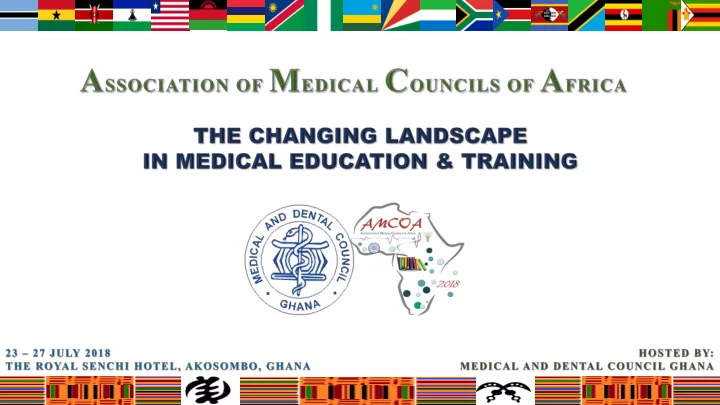

Medical Core Curriculum & the Delivery ry Mode (ZAMBIAN PERSPECTIVE)
Prof. . Sekelani i S. . Banda MB B Ch ChB, MSc, MMEd, PhD, FAcadMEd Fellow Fellow Fellow Senior Advisor to the President International Fellowships in Medical Education (IFME)
Presentation Outline 1. Definitions. 2. Current Situation in Zambia and the Region. 3. Critique of Practices in Africa & Internationally. 4. Core Curriculum & Delivery Recommendations. 5. Bibliography.
Medical Core Curriculum & th the Delivery ry Mode Definition: Curriculum The Delivery Mode An educational plan that spells out the goals and objectives that should be achieved, which topics should be covered, and which methods are to be used for learning, teaching and assessment.
Current Sit ituation in in Zambia 1. Entry Criteria : A 'Level + 5 O’ Levels with credit , including English, Maths, and Science; 2. Duration : MB ChB at least 5 years (excluding A Levels) = 200 weeks (40 weeks/year), 20 hrs/week; 3. Curriculum Design (Delivery Mode): Traditional Innovative Hybrid
Medical Sc School Accreditation St Standards in in Z Zambia Minimum Process Standards World Federation for Medical Education (WFME) 1. Mission & Objectives ; 2. Educational Programme ; 3. Assessment of Students ; 4. Students ; 5. Academic Faculty ; 6. Educational Resources ; 7. Programme Evaluation ; 8. Governance & Administration ; 9. Continuous Renewal.
Min inim imum Core Curric iculu lum Requir irements in in Zambia Licensure Examinations Introduced in Core Curriculum Outcomes 2018: Competence & Fitness for Purpose Outcome 1 : Biomedical, Behavioural, & Scientific Process Knowledge; Outcome 2 : Clinical Practice Competence; Outcome 3 : Professionalism & Ethics; Outcome 4 : Admin, Management & Health Systems.
Crit itiq ique of Medic ical l Education Practic ices in in Afric ica & In Internationall lly Pedagogy is Neglected! Traditional Practices • Traditional model persists with attendant negative pedagogical traits – F.L.O.P.P.Y (next slide) • Standard setting for pass/fail criteria still Arbitrary . • Regulators too prescriptive ( standardization craze ). • Pedagogy is neglected : Facilitating learning, assessment, curricula design, educational leadership!
Negative Pedagogical Traits - FLOPPY Traditional Practices Educational Criticism • Faculty centred • Low-order Intellectual demand • Opportunistic • Poor Integration • Poor Relevance. • Years of tradition not evidence.
Core Curric iculum & Deliv livery ry Recommendations Recommendation Institutional 1. Develop national & regional Reference Documents for Policies & Undergraduate, Postgraduate Education & Training & Legislation CPD Guidelines. Innovation and 2. Create Frameworks for Quality Assurance that support Creativity innovation & creativity. Avoid being prescriptive. Setting 3. Process Standards – Recognition & Accreditation Standards Procedures 4. Outcome/Competence Standards – Licensure Examinations 5. Faculty Standards – Development of Educational Skills.
Bib ibliography • Banda, S.S. (2016). Standard Setting as a Catalyst for Quality in Health Professions Education: A Conceptual Approach. Afr J Health Professions Educ 2016; 8 (1): 9-10. DOI:10.7196/AJHPE.2016.v8i1.712. • Kiguli-Malwadde, E., Talib, Z., Wholtjen, H., Connors, S., Gandari, J., Banda, S.S, Maggio, L., and Van Schalkwyk, S. (2015). Medical education departments: A study of four medical schools in Sub- Saharan Africa. BMC Medical Education (15: 109 DOI. 10.1186/s12909-015-0398-y. URL: http//www.biomedcentral.com/1472-6920/15/109. • Norcini, J.J, and Banda, S.S. (2011). Increasing the Quality and Capacity of Education: The Challenge for the 21st Century. Medical Education, 45:81-86. Doi:10.1111/j.1365-2923- 2010.03738.x. • Basic Medical Education WFME Global Standards for Quality Improvement World Federation for Medical Education – WFME (2003). • Bransford, J; Brown, A; Cocking, R (Editors) (2000). How People Learn: Brain, Mind, Experience, and School. National Research Council; National Academy Press, Washington DC. ISBN 0-309- 07036-8.
Recommend
More recommend